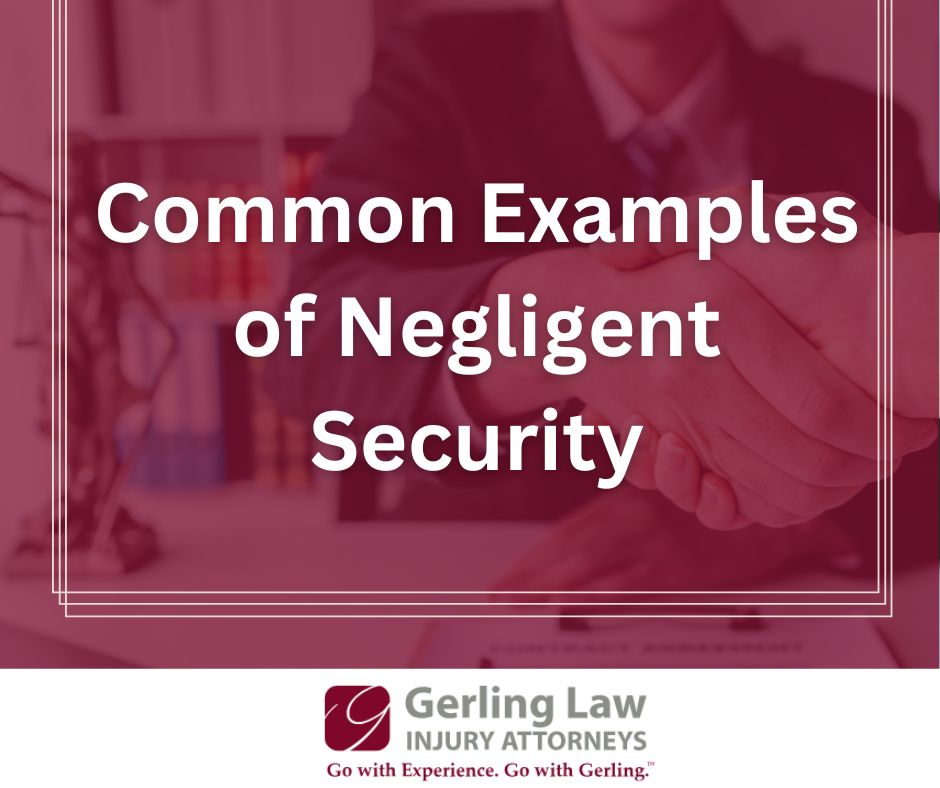
Every day, millions of Indiana residents enter officers, shopping centers, and other publicly accessible areas. We trust the owners of these places to take proactive measures to minimize danger and respond to dangerous situations. Sadly, many property owners and their tenants fail to provide adequate security, leading to severe injuries and even death.
Indiana law allows victims of negligent security to seek compensation. However, many people don’t know whether their case qualifies as negligent security or where to begin if it does.
If you suffered physical or financial harm due to a security failure, contact Gerling Law Injury Attorneys. Our firm has seen many inadequate security lawsuit examples and can advise you on how to protect your legal rights.
What Is Negligent Security?
Property owners have a duty to provide adequate safety measures. Yet, many owners breach this duty by failing to take the necessary steps to monitor their property and ensure safety. Negligent security occurs when the property owner’s breach is the cause of a guest’s injuries.
If you experienced negligent security, you have the legal right to seek compensation from the liable party.
What Are Examples of Negligent Security?
Knowing when you have a valid claim can be difficult. Look over the following examples of negligent security to learn more about this issue. After this, contact Gerling Law for a free case review to discuss your potential claim.
Inadequate Lighting
A lack of proper lighting increases the likelihood of accidents and criminal activities. Property owners must take precautions to ensure guests aren’t vulnerable due to poor lighting.
Injuries due to inadequate lighting often occur for these reasons:
- Poorly lit parking lots. Dark parking areas increase the risk of vehicle break-ins, theft, and assaults on pedestrians. Poor lighting can also contribute to car accidents and personal injuries for people entering and leaving the premises.
- Dimly lit doorways. Improper lighting around entrances can create hazards for visitors and occupants. It may reduce visibility, making it hard to identify hazards or potential threats lurking in the surroundings.
- Unlit walkways. Areas without proper lighting present tripping hazards and increase the risk of accidents. It also may create concealed areas for criminals to target passersby.
Sadly, many property owners fail to provide adequate lighting despite these risks.
Lack of Surveillance Cameras
The absence of surveillance cameras is a significant breach of security. It leaves properties vulnerable to various threats and criminal activities. Surveillance cameras are crucial for monitoring safety and capturing vital footage.
Properties without proper surveillance might experience:
- Increased criminal activity. Without surveillance cameras, properties are more likely to become targets for criminal activities such as burglary, vandalism, and trespassing. The absence of monitoring can embolden perpetrators, as they feel less likely to be apprehended or identified.
- Limited ability to monitor events. Properties without surveillance cameras have limited visibility over their premises. This lack of monitoring makes addressing security breaches or suspicious behavior challenging.
- Difficulty in investigating incidents. Surveillance footage can assist investigations and help identify perpetrators. Without it, law enforcement might struggle to find bad actors and hold them accountable.
Properties that fail to provide adequate surveillance create unnecessary risks for their guests. Victims who suffer because of this failure can file a negligent security claim.
Faulty Locks and Security Systems
Locks are the fundamental barrier between safety and potential threats. When locks and security systems malfunction or fail, they leave property vulnerable to breaches, theft, and other security incidents. This undermines the overall safety and protection measures in place.
Signs of negligent security involving locks and security systems include:
- Broken locks on doors and windows. Doors and windows with broken locks are easy targets for intruders seeking unauthorized entry. Intruders can then cause victims personal harm, property loss, and other damages.
- Alarm systems with weaknesses. Malfunctioning alarm systems fail to provide timely alerts and notifications during security breaches. Likewise, false alarms cause complacency that lowers the effectiveness of alarm systems.
- Outdated security measures. Using low-quality or outdated security systems, such as padlocks and chains, leaves properties vulnerable. These inadequate security measures are easily compromised and put occupants at risk.
Property owners must focus on maintenance, inspection, and upgrading of locks and security systems. This ensures their effectiveness in safeguarding the property and its occupants.
Failure to Screen Visitors
Property owners must establish a way to ensure that only guests enter the premises. Screening visitors is essential for identifying potential risks. Properties that neglect to use proper visitor screening procedures put guests at risk of harm.
Examples of poor screening practices include:
- Allowing unchecked access to facilities. A lack of security at entry points such as gates, entrances, or reception areas puts all guests at risk. Bad actors can enter at any time without any indication of their intent.
- Neglecting identification verification procedures. Failure to verify the identity of visitors is key to protecting occupants. Properties that do not require visitors to provide identification or to sign in upon arrival are susceptible to serious security threats.
- Skipping bag checks. Owners should screen visitors’ bags and personal items for prohibited items, weapons, or contraband. If your injury is due to an unchecked bag, you may have the right to seek compensation from the property owner.
Property owners and managers must implement visitor screening procedures to keep guests safe and reduce legal liability.
Negligent Hiring Practices
Employers have a legal duty to ensure their employees are suitable and trustworthy. When negligent hiring occurs, there is an increased risk of violence, theft, and legal liability.
Negligent security claim examples related to hiring practices include:
- Employing individuals with criminal records. Hiring individuals with criminal records can compromise workplace safety and security. This increases the likelihood of incidents such as theft, violence, or breaches of trust, endangering the well-being of employees and visitors.
- Failing to conduct drug tests. Many positions require employees to have full cognitive function and quick reaction abilities. An employer who fails to screen candidates for drug use can be liable for any safety incidents that occur as a result.
- Ignoring warnings of potential misconduct. Employers must investigate or address warning signs that indicate wrongdoing, such as discrepancies in information provided by candidates or reports of past misconduct or disciplinary actions. Ignoring these red flags can put coworkers and guests at risk.
Poor and ineffective hiring is one of the most common examples of negligent security. Property owners must take measured steps to hire talent or face legal liability.
Schedule Your Free Case Review
Gerling Law is a leading personal injury firm in Indiana. Over the last five decades, our team has helped countless victims get justice after a negligent security incident. We are ready to fight for your rights and seek the most compensation for your injuries.
Call today to schedule a no-obligation case consultation.

